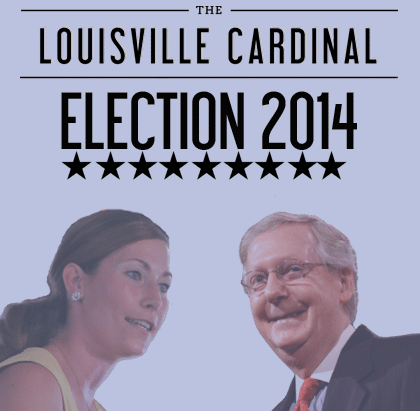College students seem to be engaged in politics, but that might not translate into votes on Nov. 4. With the U.S. Senate race between Republican incumbent Mitch McConnell and Democrat Alison Lundergan Grimes wrapping up this week, the college vote may help determine the outcome.
“Essentially, at this point, the race is a dead heat,” said Dewey Clayton, political science professor at U of L.
With election day fast approaching, Belknap campus is nearly void of campaigners. Neither Grimes nor McConnell has campaigned in person on campus since the start of the fall semester. Grimes appeared once at the Red Barn on June 29 to speak about college affordability.
“There is probably not as much concern as I would like there to be,” said Clayton. “It is because it is a midterm election, and it just tends to not motivate people.”
According to the Pew Research Center, less than 40 percent of those eligible actually vote in midterm elections. In Kentucky, the percentage of 18 to 29 year olds that vote in midterm elections is even slimmer – only 22.9 percent, says the Center for Information & Research on Civic Learning & Engagement.
“It is wise for both parties to have visibility and, for lack of a better word, take advantage of college student’s low information levels to educate them, not only of the candidate’s point of view, but the importance of the election and party issues that affect students,” said Jasmine Farrier, a political science professor.
“The most effective way to get college students engaged in politics is to inform them that politics affects their lives,” said U of L senior Arsh Haque. “This can take the shape of special interest groups making infographics, campaign volunteers badgering students on their way to class or someone to sit down and talk to at a voter registration drive.”
Sherman Brown, a political advisor at McCarthy Strategic Solutions in Frankfort, gave his views on college voters.
“I think this generation is paying more attention, not just to who they vote for, but actually holding their leaders accountable,” said Brown.
Brown also noted that tech savvy campaigning targets young voters especially.
“Instead of winning the day, now you are trying to win the hour,” he said.
According to Clayton, youth political attitudes, values and spending habits influence this country in ways that young people may not realize. He listed student loans, healthcare and the minimum wage as top issues for young voters.
“The candidates of this race are well aware of the power of the voter, and especially of the young voter,” said sophomore Aaron Vance, who is the political coordinator for SGA.
“If candidates and parties are not interested in college students,” said Farrier, “it is just a vicious circle, because then they will win without you. They will not feel any responsibility to you, and then you will be turned off because nobody seems to care about you, and you will not participate.”
Besides the fact that this is a midterm election, college students may not participate because there are challenges to get to the ballot box. Some U of L students call Louisville a temporary home, and registering to vote in this city is not a priority.
“There is the issue of voting absentee ballot or travelling back to their hometown and voting on that day,” said Clayton. “Every time you have to add a layer that is requiring you to do something to vote, then that is going to discourage some people and hurt the actual turnout.”
“I would suspect that some students might not even be aware that you have to be registered in this state roughly 30 days before the election,” he said.
“We burden the voters in America,” said Farrier. “They have to keep up with their registration, and college students move a lot.”
To encourage his peers to vote, Vance said, “Your vote is a tool that is used in conjunction with others to amplify what you think is right and should not be thrown away.”
“I think that clearly, if millenials get out and vote, that will probably help Alison Grimes more than it probably will help Senator McConnell, because his base of voters traditionally tend to be 50 and older and white,” said Clayton.
Clayton also noted that he would like to see millennials run for office themselves.
“Rather than always voting for the right person, you be the right person. You get involved in politics. You make that change yourself,” said Clayton.
In the meantime, the results of this midterm Senate race will depend on the Kentuckians who will cast their ballot on or before Nov. 4.




